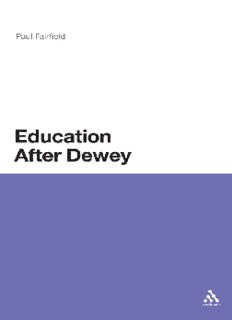
Education After Dewey PDF
Preview Education After Dewey
Education After Dewey PAUL FAIRFIELD ContinuumInternationalPublishingGroup TheTowerBuilding,11YorkRoad,LondonSE17NX 80MaidenLane,Suite704,NewYork,NY10038 www.continuumbooks.com ©PaulFairfield2009 Allrightsreserved.Nopartofthispublicationmaybereproducedortransmitted inanyformorbyanymeans,electronicormechanical,includingphotocopying, recording,oranyinformationstorageorretrievalsystem, withoutpriorpermissioninwritingfromthepublishers. PaulFairfieldhasassertedhisrightundertheCopyright,DesignsandPatents Act,1988,tobeidentifiedasAuthorofthiswork. BritishLibraryCataloguing-in-PublicationData AcataloguerecordforthisbookisavailablefromtheBritishLibrary. ISBN:978-1-4411-4586-4(hardcover) LibraryofCongressCataloging-in-PublicationData Fairfield,Paul,1966- EducationAfterDewey/PaulFairfield. p.cm. ISBN978-1-4411-4586-4(hardcover) 1. Education--Philosophy.2. Education--Aimsandobjectives.3.Education, Humanistic.4. Dewey,John,1859-1952. I.Title. LB14.7.F332009 370.1--dc22 2009012059 TypesetbyKennethBurnley,Wirral,Cheshire PrintedandboundinGreatBritainby... Chapter 1 Contents ANoteaboutReferences vii Introduction:AnEnigmaticTransition 1 Part1:TheEducativeProcess 1 BeyondProgressivismandConservatism 13 2 Dewey’sCopernicanRevolution 52 3 WhatIsCalledThinking? 101 Part2:EducationintheHumanSciences 4 TeachingPhilosophy:TheScholasticandtheThinker 149 5 TeachingReligion:SpiritualTrainingorIndoctrination? 183 6 TeachingEthics:FromMoralismtoExperimentalism 210 7 TeachingPolitics:TrainingforDemocraticCitizenship 233 8 TeachingHistory:ThePastandthePresent 257 9 TeachingLiterature:LifeandNarrative 280 Index 305 For Gwyneth Fairfield Chapter 1 A Note about References All references to John Dewey’s texts are from The Collected Works, 1882– 1953, edited by Jo Ann Boydston and published by Southern Illinois University Press. In the endnotes, EW refers to The Early Works, 1882– 1898 (5 volumes), MW refers to The Middle Works, 1899–1924 (15 volumes),andLWreferstoTheLaterWorks,1925–1953(17volumes). This page intentionally left blank Introduction An Enigmatic Transition The crucial matter in education is the transition from relative ignorance to a condition as difficult to attain as to describe theoretically: intellectual agency,maturity,emancipation,or,moremodestly,beinginformedareafew possibilities.Educationisthenameforthistransitionortransformation,the ambiguityofwhichhaslongbeenatopicoftheoreticalreflection.Indescrib- ingthelearningprocess,Platofirstemphasizedthedifficultyofleadingthe mindfromtheworldofillusionthatisitsoriginalabodetoenlightenment. His account of this process was couched in epistemological and metaphysi- caltermsthatnolongerwarrantbeliefevenasthestoryofthecaveitselfand theprisoners’gradualintroductiontotheworldaboveretainsaspecialrele- vance, as a metaphor at least. This should not surprise us; metaphorical interpretationsoftenshedlightinawaythatliteralandtheoreticalproposi- tions do not, particularly when what we would describe is as ambiguous as the nature of the educative process and the aims that guide it. Our goal in thisstudyistounderstandthisprocess.Itisaprojectthatwillnotsucceedif weoverlookthisambiguityorinsistonreducingittozero,fortheambiguity of education directly reflects that of human experience in general. It is a qualitythatwemustcopewithandendeavortoclarify,butgainingclarityhas its limits when the thing itself is no mere technical puzzle but belongs fundamentallytoourexperienceoftheworld. Several possibilities suggest themselves, some more metaphorical than others,inspeakingofthistransition:frombondagetoliberation,illusionto enlightenment, ignorance to the truth, nature to culture, immaturity to maturity, possessing less information or skills to more, and so on. Each succeeds in some measure in illuminating the phenomena of teaching and learning. In thinking about education we are often tempted to select one suchphraseandsetitupasamodeltowhicheverythingcanbereduced,but if the object of inquiry is itself multidimensional, so as well must be our account of it. It is here that reductionist theories run aground: deeming clarityandsimplicitycardinalvirtuesoftheorizingingeneral,theyreduceall richness and complexity to artificial simplicity and so misunderstand the object.Thisremainsacommonfailingofeducationaltheories.Ontheside of the individual, education represents a transformation of perspective that 1 2 Introduction in one fashion or another raises the mind to a condition of some higher kind, or kinds. It informs and transforms in about equal measure, depend- ingonthesubjectmatter,thestageofthelearningprocess,andavarietyof otherfactors.Onthesideofthesocial,educationinitiatestheyoungintoa tradition; it produces acculturation and makes it possible for the younger generation to participate in the ways of an historical community. The indi- vidual and the social dimensions of education are themselves inseparable, addingfurthertoitscomplexity.Thispracticealsohasanunmistakablepolit- ical dimension, is often difficult to distinguish from indoctrination, draws upon an underdeveloped and often reductive understanding of human psychology,andhaslongbeentheplaygroundofsocialengineersandenthu- siasts of every possible kind, all of whom maintain that the solution to our problems is to mold the young in accordance with whatever opinions they holddear.Nopracticeisasvulnerableaseducationtopoliticalorscientific fashion, its practitioners continually pulled this way and that by the latest findingsinthesocialsciencesaswellasbyeconomicimperativesandsocietal trendsthathavelittletodowiththecultivationofintellectualmaturity.Edu- cationalmeddlingbyanendlessarrayofthewellmeaningbutmisinformed remainsascommonplaceinourtimesasinanyother,theeffectofwhichis not only, and not primarily, to educate the mind but to produce a certain formofsubjectivity:workers,consumers,orbelieversofonekindoranother. A consequence of scientific and philosophical theorizing, social forces andeconomicpressures,aswellasthecomplexitiesalreadyinherenttothe learningprocess,isacertainlackoforientationonthepartofeducators,or an orientation beset by contradictions. Educators are charged with deliver- inga curriculumthey have littleor nopartinselecting,preparingstudents for standardized tests produced by ostensible experts, training a workforce, preserving traditions, managing behavior, instilling values, acting as role models and therapists, applying techniques and research findings while raising standards as governments understand or misunderstand the phrase. Educationtodaycanbelikenedtoasoupover-richiningredients:everynew cook in the kitchen adds a pinch of this and a dash of that until at last the concoctionhaseverythinginitbutflavor.Cooks,topushthemetaphorabit, typically do not see their customers, while those responsible for serving up thetastelessbrewknowverywellhowitisgoingover,yetneitherservernor customerhasanysayastoitscomposition.Bythetimethereviewsreachthe kitchen,therecipehaschangedyetagainalongwiththecook.Thesituation is different for university professors, of course, who have long and jealously guarded their autonomy in the classroom, but teachers at the primary and secondary levels have found their status as professionals severely compro- mised as the scope for independent judgment diminishes. Teachers faced with these conditions may be forgiven for being bewildered, caught as they An Enigmatic Transition 3 are in the maelstrom of empirical studies and social realities, politics and religion, philosophy and other philosophies, psychology and other psy- chologies,andlackingtheautonomypropertoanyprofessionaltoformand actontheirownjudgment. The real world of education is a miscellany of often irreconcilable aims, imperatives,andfashions,manyofwhichareextraneoustothepracticeand simply imposed from without, and all of which individual educators must squareinsomeprecariouswaywiththerealitiesoftheclassroom.Togetour bearingswemustgainamoreexplicitunderstandingofthetransitionnoted aboveandtheprinciplesthatbelongtoit.Thereis,asIshallargue,alogic that is always already inherent to the educative process. The philosopher’s taskistorenderthislogicordynamicexplicitandtoidentifyitsimplications. Itisalsotocritiqueapproachestoeducationthateffectivelyunderminethis logiceitherbypursuingmeansthatnegatethepractice’sownaimsorbysub- stitutingextraneousends,acommonoccurrenceatpresentifitisnotindeed auniversalphenomenon. Likeanysocialpractice,educationcontainsitsownimmanentconditions and ends which can be undermined when pursued by improper means or when conflicting aims supplant them. The temptation toward the latter is greatandcertainlynotlimitedtoourowntimeandplace.Theclassroomwill remain the playground of politicians and social engineers, religionists and enthusiasts,socialscientistsandphilosophers,sometimesforthebetterand sometimesnot.Whentheyareforthebetter,sucheffortsrecognizeakindof integrity – an integration of principles – inherent to the learning process, principles that must be identified and implemented if the practice is to succeed. When for the worse, these efforts reduce education to a mere meanstoanend,usuallyanenddefinedintermsofeconomics,politics,or religion. Whatever education is at the most fundamental level of analysis, it is not merely a means to an end. While it has always been known that a good education prepares one for a career and for later life in general – whether directlyorindirectly,byintentionorbyaccident–itsmeaningisnotlimited to this. In particular, it is not limited to economic utility. There is a higher purpose that education serves, as Plato taught us to see even while mis- describingthispurposeorconstruingitincrude,metaphysicalterms. Tounderstandthenatureandpurposeofeducationwemustviewitinthe larger context of human experience. The philosophical concept of experi- ence provides the most appropriate point of view from which to interpret ourthemeforthereasonthatthetransitionthateducationessentiallyisisa transition in our experience of ourselves and our world. Beyond having acquired a certain amount of information, the educated mind possesses a capacity for experience that is richer and more expansive than its less
Description: